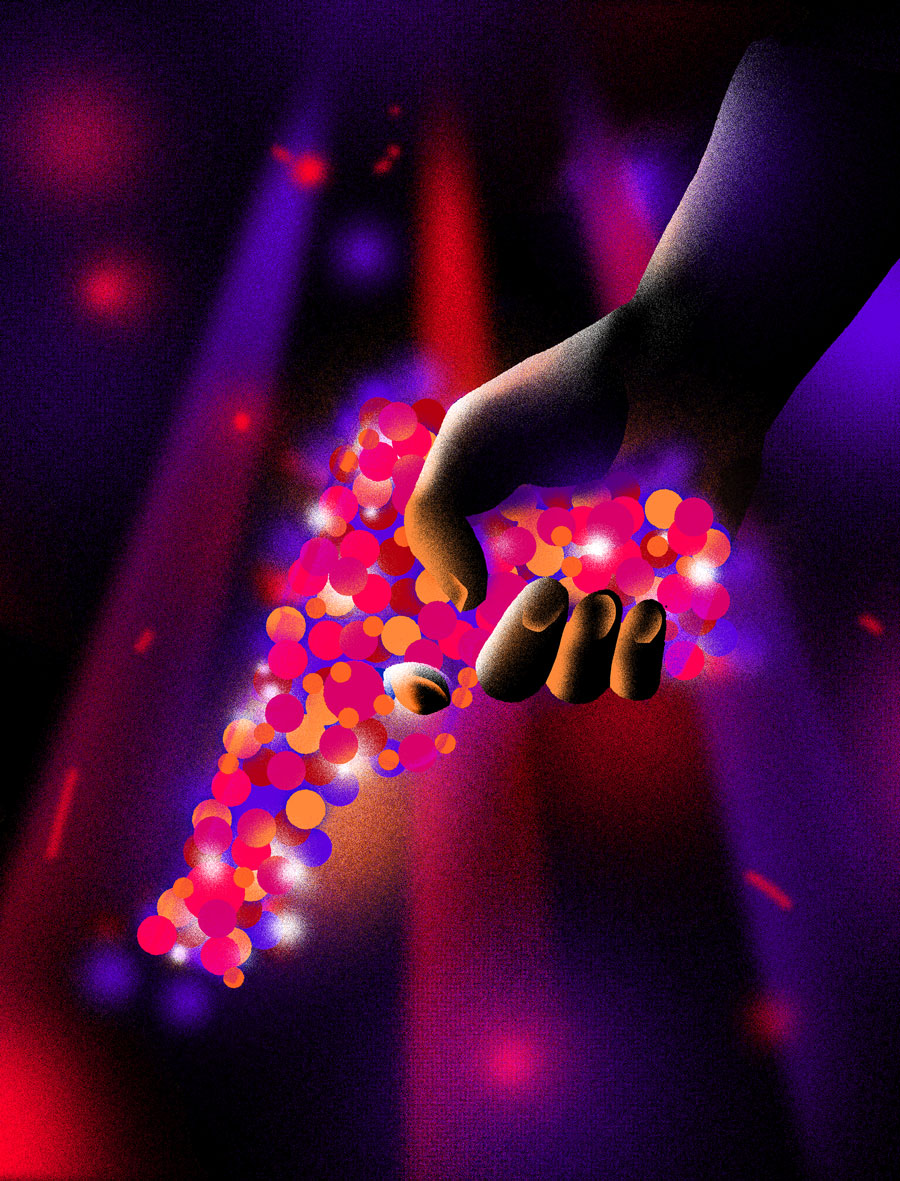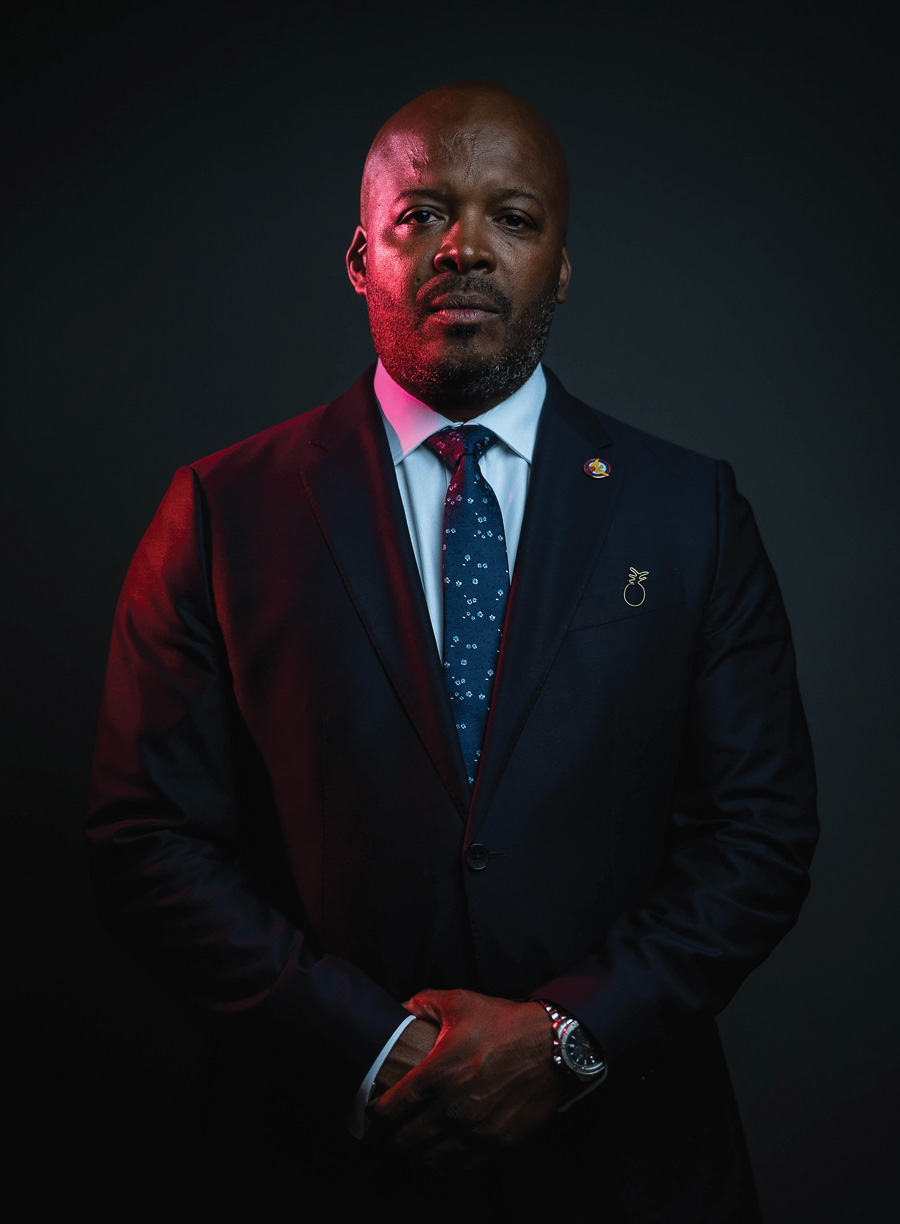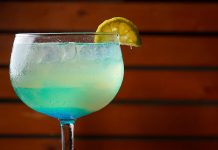
Illustration by Daniel Zender
On a spring night, five armed men and a woman wearing plate carriers stood guard in front of Allure Gentlemen’s Club like they were transferring bullion. One of them asked me to spread my legs and . . . well, let’s say I’ve never been so thoroughly frisked. I’ve had less intimate physical contact as foreplay. Then, a second bouncer went over me again.
I was out at the Cheshire Bridge strip club with two friends a few weeks after a guy got shot in an argument in its parking lot. This shooting, the second in two years, was the last straw for the neighborhood. Allure’s liquor license was scheduled for a “due cause” revocation hearing, and I wanted to get a vibe check beforehand.
One of my friends, Desmond Hardy, regularly moonlights as club security around Atlanta. “Clubs on Cheshire Bridge are the off-Broadway of Atlanta,” he said, smiling. Trap music made Atlanta’s strip clubs world famous. Places like Magic City and the Clermont Lounge have become semireformed tourist attractions, less threatening to a visitor’s dignity than a children’s beauty pageant. One disparages such places at peril in Atlanta.
The problem, Hardy said, is that the Atlanta club scene “is inconsistent and unregulated. Unfortunately, this creates a massive problem at the intersection of urban planning and public safety, because there aren’t a consistent set of experiences or venues for tourists or locals to frequent without disruption.” Some of Atlanta’s late-night clubs and restaurants have been the scenes of regular shootings. People are dying. Those deaths put Atlanta’s famed nightlife business itself at risk.
They’re also ruining Andre Dickens’s sleep.
“Every day as mayor, I get an alert anytime there’s an incident,” Dickens said at an April training event for bar and restaurant owners in City Hall’s bright marble atrium. “Because of anticipation, my body now wakes up about two o’clock, and I sit there, and I fool around, and I think about what’s going to happen. Some nights, nothing happens. But some nights, I get a buzz and there’s a shot, and I look at the location, and it’s within a block or two of some of our nightlife establishments.”
Between the start of the pandemic and Dickens’s inauguration in January, Atlanta experienced about 70 homicides above its prepandemic baseline; almost a third of those occurred within yards of sketchy clubs and restaurants, a product of spontaneous rage, gang warfare, drunken idiocy, and Georgia’s gun culture. At the same time, as violence linked to the city’s nightlife exploded, Atlanta’s nightlife enforcement fell apart: A scathing report last year showed that the police unit enforcing liquor license standards was at about half staff, and that recommendations to pull licenses had piled up without action on Mayor Keisha Lance Bottoms’s desk. Some restaurants had effectively become nightclubs by flouting license standards. Other places regularly sold alcohol without a license at all, waiting to get caught. Operators of unregulated bars are more likely to look the other way while crimes occur. Meanwhile, bodies stacked up.
Dickens established a nightlife division to enforce liquor laws and hold bars and restaurants accountable for violence. At the same time, the city is trying to reduce bureaucracy that contributed to businesses flouting the law, said Michael Paul, the city’s newly appointed nightlife manager. “There needs to be a hard reset where we can provide the tools to be successful,” Paul said. “We want to meet with all these people and say, How can we help you to get where you need to get?”

Photograph by Steve West
Paul is going to be a kind of “night mayor,” who can act with authority when something terrible happens after hours, up to shutting a place down on an emergency basis. But he’s also, deliberately, a middleman in the system. “We want to be a resource,” Paul continued—the April training was the first of what will be a quarterly series for nightlife operators, covering topics like deescalation, first aid, and neighborhood relations. “We don’t want to be hard on compliance. Owners and operators have had a tough time. But at the same time, skirting the system is not the best way to do that. If you’ve got bad operators, it’s a drain on good operators.”
Atlanta’s new nightlife division is essentially a carrot-and-stick trade. It promises less burdensome compliance, along with a meaningful threat of punishment moving forward. (At press time, a decision was pending on the fate of Allure Gentlemen’s Club.) Dickens unloaded at the end of the training event in April to make that point. “It is no longer acceptable for you to tell me that the only solution to crime that happens after a dispute occurred in your establishment is that it’s on us to monitor the parked cars on the streets. I’m telling you now, this mayor, this office, is desperately trying to make sure that, if they enter your doors and they exit your doors, the next door they go to is their home, not to the hospital. My phone at 2 to 3—I want to see a transition from these sleepless nights,” Dickens said, shouting. “The truth of the matter is, some of you are turning a blind eye to foolishness that’s happening inside. I can take your permit. I don’t want people not coming home each night. Are we clear?”
The club owners who attended nodded soberly.
This article appears in our July 2022 issue.














